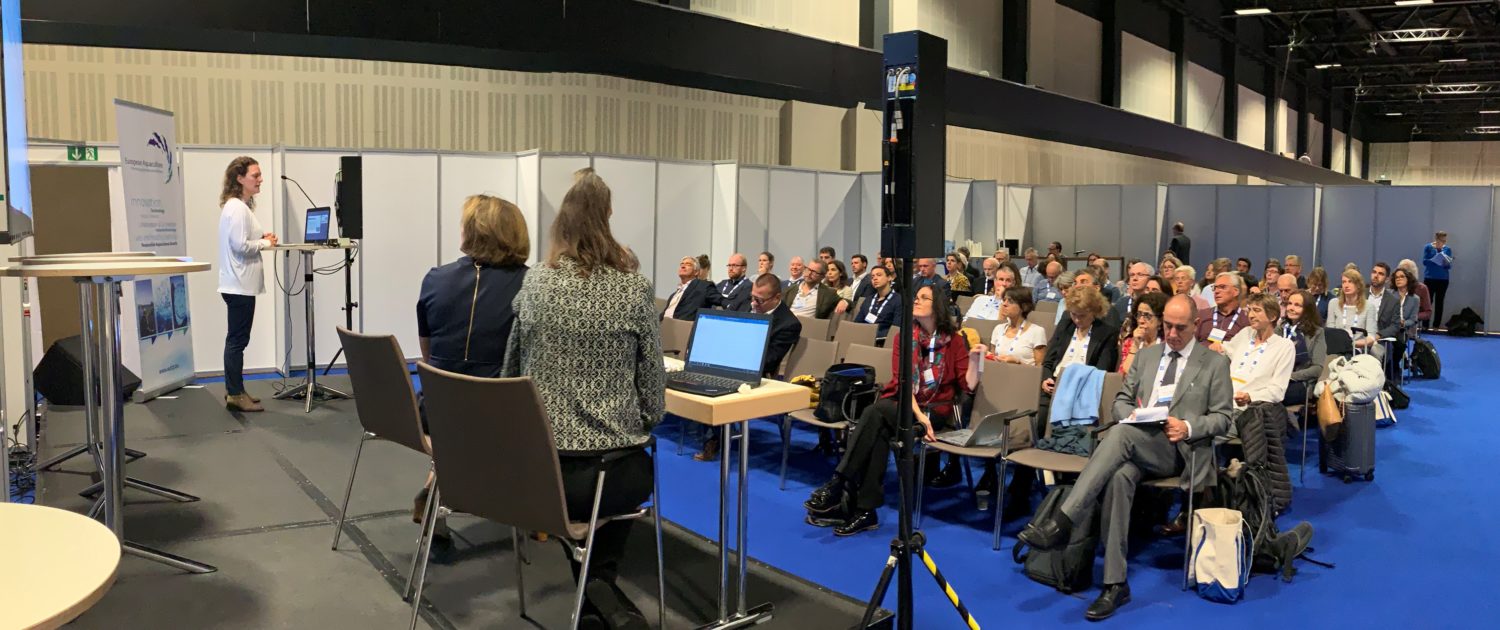EU EATiP Day presentations (Aquaculture Europe ’19)

As a response to the call for food and feed security, parallel to the needed climate, circularity, spatial planning and biodiversity actions, attention at this year’s EU EATiP day was given to low-trophic aquaculture. With its potential to create a high output while minimizing its impact, new value chains in aquaculture based on shellfish, algae or other low-trophic organisms offer a high potential for Europe.
Representatives from DG RTD and DG MARE pointed at the importance of these timely discussions, against the background of the Horizon Europe framework programme and of the revision of the Strategic Guidelines for Sustainable Development of EU Aquaculture. At the same time, EATiP launched its Position Paper and Recommendations for research and innovation in the sector. The latest results from a number of EU funded projects were combined with considerations from feed suppliers, seafood producers, market analysts and NGO’s. Together with reflections from the panel and from the audience in the room, these provide important input when planning for future collaborative efforts. A final report will be published soon.
Please find below the presentations from the session speakers.
Do you wish to contribute? Please send us a message at secretariat@eatip.eu
EATiP Day Agenda:
EATiP Day Presentations
SESSION 1: Setting the scene – How can European research and innovation stimulate sustainability and competitiveness of the aquaculture sector?
- Alexandra Neyts, EATiP. WELCOME AND INTRODUCTION TO THE SESSION
- Marta Iglesias / Miguel Lizaso, European Commission DG RTD. R&I FOR AQUACULTURE: SCIENCE FOR THE NEW CHALLENGES.
- Lorella de la Cruz, European Commission DG MARE. WORKING TOWARDS A REVIEWED STRATEGY FOR EU AQUACULTURE: PLACING AQUACULTURE IN THE CONTEXT OF BROAD POLICY CHALLENGES
- Raphaëla Le Gouvello, International Union for Conservation of Nature (IUCN). LOOKING AT SYNERGIES BETWEEN AQUACULTURE AND CONSERVATION
- Yolanda Molares, ACUIPLUS/EATiP. SECTOR RECOMMENDATIONS FOR GROWTH, SUSTAINABILITY AND INNOVATION – A MULTI-STAKEHOLDER PERSPECTIVE.
- Kjell Inge Reitan, NTNU, and Jorunn Skjermo, SINTEF. MICRO- AND MACROALGAE SESSION CHAIRS REFLECTING ON HIGH-IMPACT OUTCOMES
SESSION 2 – Low trophic production technologies and new feed resources
- Ole Christensen, Biomar. CURRENT EXPERIENCES, FUTURE BOTTLENECKS AND OPPORTUNITIES OF NEW FEED INGREDIENTS FROM LOW-TROPHIC RESOURCES
- Ragnar Nystøyl, Kontali Analyse / EUMOFA. MARKETS FOR LOW TROPHIC AQUACULTURE PRODUCTS – SOME CRITICAL MARKET CONSIDERATIONS
- Jose M. Pinilla, NATAC BIOTECH SL. AQUOLIVE – IMPROVING AQUACULTURE PRODUCTION WITH BIOACTIVES FROM OLIVE OIL PROCESSING BY-PRODUCTS.
- Maria BARBOSA, Wageningen University & Research. MAGNIFICENT- RELIABLE MICROALGAE PRODUCTS SERVING MARKET DEMANDS FOR A SUSTAINABLE FUTURE
- Philip James, Nofima. AQUAVITAE – NEW SPECIES, PROCESSES AND PRODUCTS CONTRIBUTING TO INCREASED PRODUCTION AND IMPROVED SUSTAINABILITY IN EMERGING LOW TROPHIC, AND EXISTING LOW AND HIGH TROPHIC AQUACULTURE VALUE CHAINS IN THE ATLANTIC.
- PhD Urd Grandorf Bak, R&D Ocean Forest MACRO CASCADE A production platform processing cultivated seaweed into a range of value-added product
SESSION 3 – Efficient management systems to optimize sustainability and competitiveness.
- Lorenzo Gennari, EMPA. SHELLFISH INDUSTRY – A LOW TROPHIC AQUACULTURE TO BE BOOSTED: OPPORTUNITIES AND CONSTRAINTS
- Ana Granados, FABRE. INTRODUCING NEW BREEDING AND GENETIC TOOLS TO OPTIMIZE THE COMPETITIVENESS OF LOW-TROPHIC SPECIES
- Dr. Anette Wilson, AquaTT (on behalf of António Marques, Instituto Portugues do Mar e da Atmosfera). SEAFOODTOMORROW – NUTRITIOUS, SAFE AND SUSTAINABLE SEAFOOD FOR CONSUMERS OF TOMORROW
- Roberto Pastres, Universita Ca’ Foscari Venezia. GAIN – GREEN AQUACULTURE INTENSIFICATION IN EUROPE.
- Isabelle Arzul, IFREMER. VIVALDI – PREVENTING AND MITIGATING FARMED BIVALVE DISEASES



Leave a Reply
Want to join the discussion?Feel free to contribute!